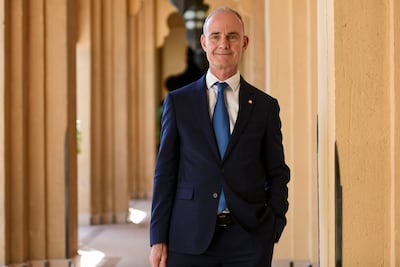Follow the latest on the earthquake in Turkey
Aid must not be politicised as efforts continue to help all parts of Syria, the Vice President of the International Committee of the Red Cross told The National, as the body urges full access into the country.
Gilles Carbonnier, speaking on the sidelines of the World Government Summit in Dubai, called the situation in Syria “extremely dire” and said access was vital to save the lives of those affected by the earthquake that struck nine days ago.
The ICRC has access to Aleppo, Latakia and Tartous, areas that were extensively damaged by the powerful 7.8-magnitude quake.
“We are speaking with all the concerned parties to make sure that the aid that we provide is not instrumentalised and is not politicised so that it reaches all the people in need,” said Mr Carbonnier.
“What is important is that we can have access to provide assistance to all those in need wherever they are located.”
The earthquake, which was followed by several deadly aftershocks, killed more than 40,000 people in Syria and Turkey, injuring and displacing thousands.
“There is a sense of urgency that we all see with regards to the need to respond immediately to the distress of people. We have doubled our efforts to reach out to all the parties concerned so that we are able to do our work,” said Mr Carbonnier.

The ICRC works as a “neutral and impartial” organisation, he said, and cannot “force an access if it is denied”. The organisation is continuing to engage in “proactive” conversations, he said.
Its President, Mirjana Spoljaric, was meeting with authorities in Syria on Wednesday.
The ICRC said on Wednesday it was “determined that the ICRC be granted the guarantees to access all those in need, and that humanitarian assistance addresses both the needs caused by the earthquake and the conflict, such as medical care and damaged water infrastructure.”
What are the ICRC's main priorities?
One of the top concerns for the ICRC is that people have lost their homes.
“We need to provide them with shelter, safe drinking water, blankets, heating, food and to ensure that medical assistance gets to the survivors,” said Mr Carbonnier.
Missing people is another top concern for the group, particularly for parents who are looking for their children and vice versa.
The ICRC has provided Syrians with a service where they can file a tracing request, to try to locate and reunite families.
“We need to be on the ground to provide that level of assistance,” he said.
The ICRC has prepared to go from the first to the second level of emergency response in Syria.
Mr Carbonnier said unity between the public and private sector and aid groups was vital so Syria can restore public services and “life gets better for these people who have suffered so much”.
Over 12 years of war, Syria's economy has been hit, pushing 90 per cent of the population below the poverty line and unemployment to as high as 50 per cent.
In areas where the ICRC is active, rescue operations are continuing despite dwindling hopes of finding survivors, with several aid groups working on the ground in devastated areas.
“What we seek to do is to make sure that there is no duplication and that it's complimentary,” said Mr Carbonnier.
“The needs are so big that we cannot afford to leave gaps and this is why all the efforts of the different organisations are welcome.”
But Syria's protracted conflict and its effect on infrastructure are hampering efforts.






